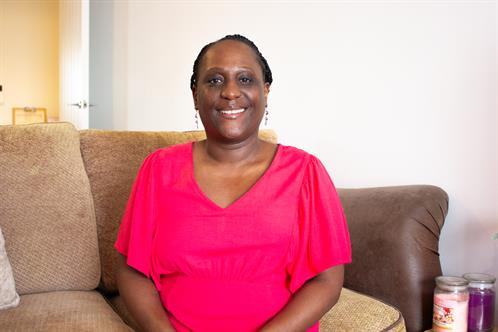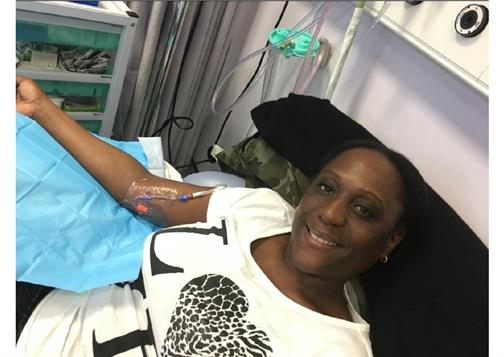
In November 2018, I was working as a community nurse and had just celebrated my 45th birthday.
My job meant I had often worked with women who had breast cancer, tending to them post-surgery to manage their drains, care for their wounds and help them cope with their diagnosis. I never thought on a personal note it would happen to me. Not at 45, not ever.
Give the gift of research and help more women with cancer live longer, better lives. Please donate today.
Both my mum and my mum's sister had been diagnosed with breast cancer, and as a result I became more aware of checking my breasts.
In August 2018, I noticed a soft, squishy lump in my left breast, but because it was only prominent when it was my time of the month, I didn’t think it could be cancer. I just thought it was related to my periods. Being a nurse, you would assume I could spot a cancerous lump. But it wasn’t hard and round like the lump I had felt on my mum. My lump was soft… so I left it for a few months.
However, one night a few months later, I had a dream in which my grandfather (who had passed away 20 years previously) told me directly I had breast cancer. I woke up the next morning and immediately booked a doctor’s appointment.
Hearing the words ‘you have cancer,’ it hit me that I might die. I remember walking down the stairs of the hospital where I worked, thinking how do I tell my children and family? Do I need to start planning my funeral? In some ways, the medical knowledge I had as a nurse made everything worse. My brain was going from zero to 100 in seconds, thinking of all the worst-case scenarios. Medical knowledge was of no advantage now. I had become a patient, just like the ladies I used to visit. But I knew I needed to beat this, for my children as well as for myself.
My daughter, Nicole, was 18 and my son, Myles, was 14 at the time. How do you tell your children you have cancer, when only a few months ago you had told them their grandma had breast cancer and also my aunt? Thank God, both are alive and well. I sat Nicole and Myles down and told them everything. I had to be honest with them, especially as they had already seen my mum go through her cancer journey. I did my best to assure them I was going to be fine, and that God was going to strengthen me and take me through. My faith was a massive factor in keeping me positive from the beginning.
‘This cancer battle was one of life’s challenges’
I always referred to my illness as THE cancer and not MY cancer. It wasn't something I was going to allow to take ownership of me. I didn't even like the term ‘the cancer patient’. I was Natasha who had a ‘cancer diagnosis’.
I viewed this cancer battle as yet another one of life’s challenges. And I had faced worse before. I lost my baby son, Jayden, 16 years earlier, when he was just 19 hours old. Having to bury a child was the worst thing ever, so much so, there were days I could not even breathe. So I vowed to fight this disease with every ounce I had within me. It was yet another awful obstacle ahead of me, but I refused to let it take me over.
Of course, there were days I really struggled, but I knew I had to fight. I told myself I was not going to die. I’ve got plans – and my faith, my family, my friends and the medical team would all help me through. Afterwards, I would tick this off as another challenge completed and the practical side of me kicked in.
Even though both my mum and aunt had been diagnosed with breast cancer, I was not tested for a BRCA mutation. I was referred to genetics, but it was felt there was unlikely to be a correlation because we were all at an age when breast cancer is more likely to occur. My aunt later discovered she did not have the BRCA mutation.
The initial plan was for me to have surgery followed by radiotherapy. But following an Oncotype test (which analyses the activity of genes that influence how likely a cancer is to grow and respond to treatment), it was determined that to prevent the cancer returning, I should have chemotherapy as well.

Image: Natasha having treatment in hospital
In February 2019, I had a left-sided mammoplasty and in April I started five months of chemotherapy – 12 tiresome rounds. This was incredibly tough. I lost my hair and my eyebrows in the first round. However, in a bid to take control, I asked my brother to shave my hair. My skin also changed colour, turning an ashen grey and then becoming really dark in colour. This was particularly hard for my children to see.
My daughter was my rock, but at the time, she didn't really share how hard she found it all. Not only was she in the middle of studying at college, she now had to look after her mum as well. Subsequently, she’s told me how difficult it was seeing me physically change and unable to carry out basic daily tasks. Even climbing the stairs to go to the bathroom was a challenge she would often have to help me with. It was hard for her to see me cry when I couldn’t eat due to nausea or the loss of my taste buds. Myles too found it tough. This made me more determined to push through for myself and my children.
‘I had cancer, cancer NEVER had me’
My approach throughout was to embrace it all. People told me how brave I was being. But to be honest, I had no choice but to tackle it head on. I could either wallow in this cancer diagnosis or crack on as best as possible. I was determined to control this cancer – it would not control me. I would often go to appointments, loaded with questions and became actively involved in my treatments.
After the chemo finished, I started daily radiotherapy for four weeks – 20 rounds in total. This felt like a breeze after the previous few months of treatment. By November 2019, I had finished all my treatment and was put on Tamoxifen – and nearly six years on since the diagnosis, I have just been told that I can stop taking it. My annual mammograms have thankfully been all clear. The last one was last year, five years after the initial diagnosis. Now I will revert to having them every three years, just like everyone else.
Of course, in the first year I had thoughts that the cancer would come back. If that pops into my head now, I shut it down very quickly. While you are going through the journey and having all the treatment, you are so aware of all the physical things. You are constantly being checked: scans, hospital appointments, blood tests and medical teams. You just roll with it, with not much time to mentally and emotionally assess. Then suddenly that all stops and you’re on your own. That's when my head started to run away with me. On top of that, your body is experiencing untold side effects as it tries to repair itself. But I refuse to live in fear. Thank God I am now well, I am cancer free and I refuse to give cancer any more energy. I gave it enough in the battle and my recovery.
‘Cultural barriers can lead to isolation’
I can honestly say, I had a really positive experience in terms of my care. Obviously, as a nurse, I had some medical knowledge and I was comfortable discussing my body and my treatment plan, but most of the time, I felt like a patient, not a nurse.
As a black woman, I am sadly aware that statistically, black women are diagnosed later and therefore might not have such successful outcomes as their counterparts.
As a woman from a Jamaican family, I was aware that cultural barriers can lead to isolation, although not in my case. Generally, within ethnic communities, we tend not to openly discuss things like cancer. Sometimes it seems as though conversations like this are kept private. It's about not putting all our business out there. But we need to break these cultural barriers, thoughts, taboos and misconceptions.
I know of women who have been isolated and ostracised from their community. It saddens me to think there could be women out there going through this journey in silence and feeling alone. That’s why I started my Instagram page (@blackbaldnbeautiful) as a way of connecting with other women, breaking down the taboos around cancer in ethnic communities. The platform started through me sharing my journey and then became a place where other women could share their photos and stories. We could support each other. I met some amazing women on there.
A breast cancer diagnosis doesn’t always mean death – you are not alone and you can beat this. Having a positive mindset was important to me as I went through this journey. Every day, I would drag myself around the park. Most days it would take hours to get ready for a simple walk, but it helped keep my mind and body flowing. My faith, family and friends stepped up in unimaginable ways. The outpouring of love and support was unreal. I knew that if I could deal with the loss of my son, I could and would be able to deal with this cancer. And I did: I beat cancer! My motto was: 'I had cancer; cancer NEVER had ME!'
'Thanks to my treatment, I am back to doing life'
A cancer journey is different for everyone. While we can all relate to each other, our individual experiences will be quite different. One of the hardest things is the impact a diagnosis can have on the family. The ripple effect means that everyone you love is touched by it and you are not necessarily the only one struggling. But it is OK not to be OK. Every day is different – one day, I would be dancing around the kitchen and the next, I would have my head in a sick bucket fighting nausea! I remember going through five brands of water trying to find one, just one brand, I could drink. It can also be challenging and frustrating, as some people will avoid you because they don't know what to say. But you don't need to suffer in silence – there are always experts who can help and lend a listening ear.
Cancer research is immensely important. Everyone knows someone who has been diagnosed or has a loved one they have lost to cancer. We need research to keep funding the search for new treatments and therapies to find a cure for this disease. We need to find alternatives to chemotherapy, which is such an unkind and gruelling treatment.
I am a survivor and I am optimistic. Thanks to my faith, family, friends and successful treatment, I am back to doing life. We need more research around this disease. Cancer doesn’t care, so we have to.
Our research is helping more women survive ovarian and breast cancer. Please donate today and support the vital work our scientists are doing to defeat cancer.
